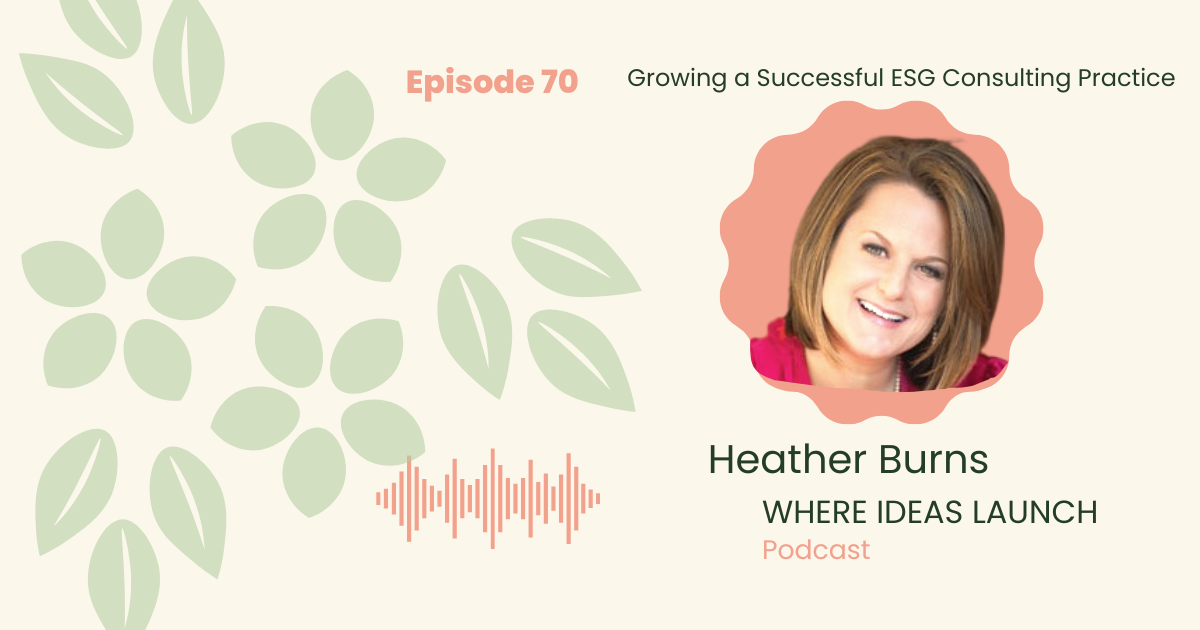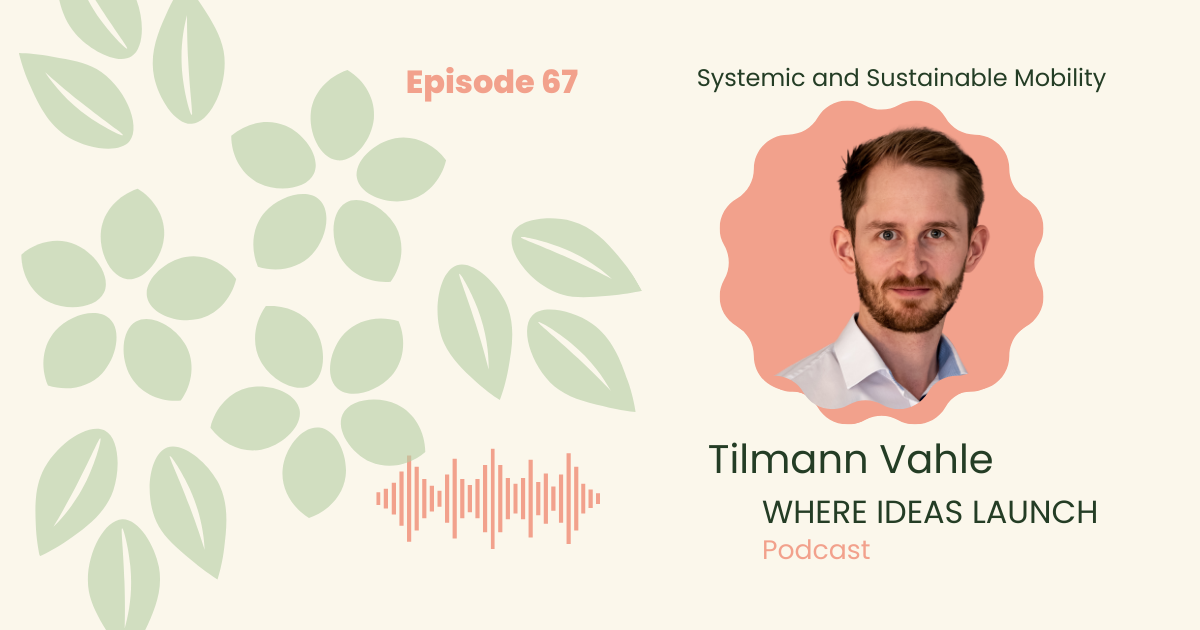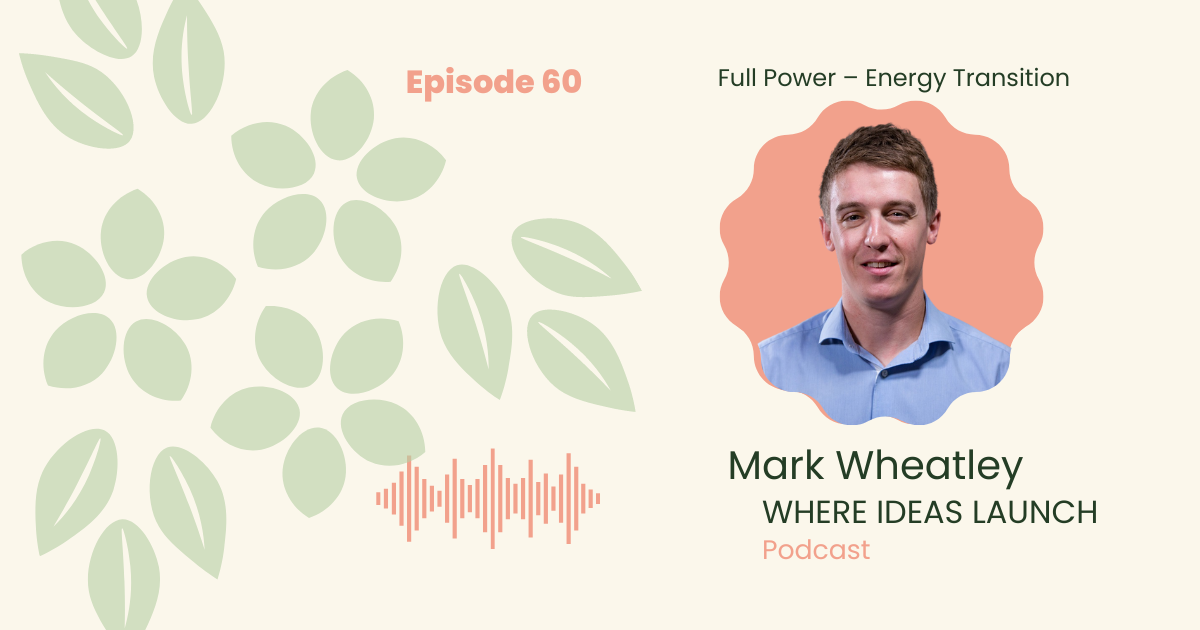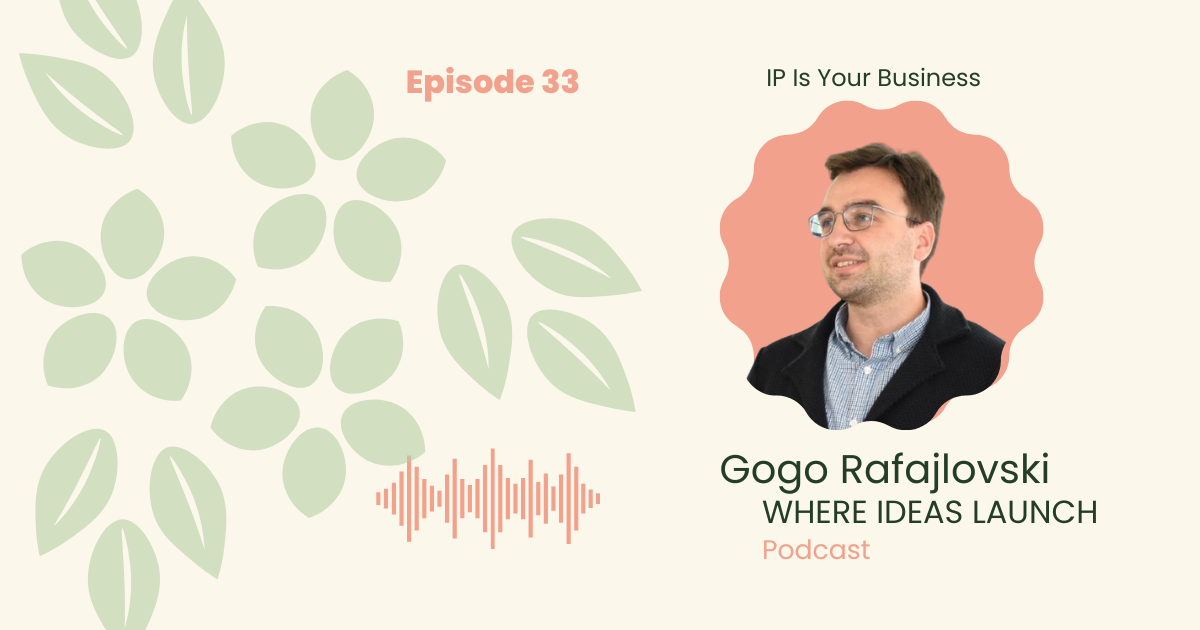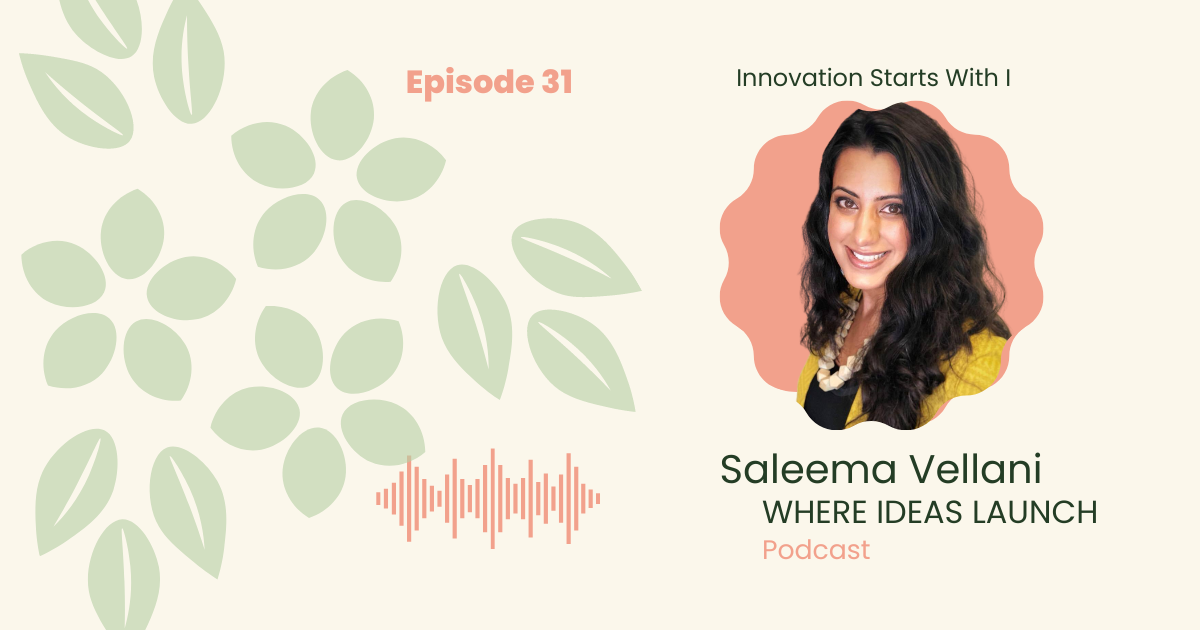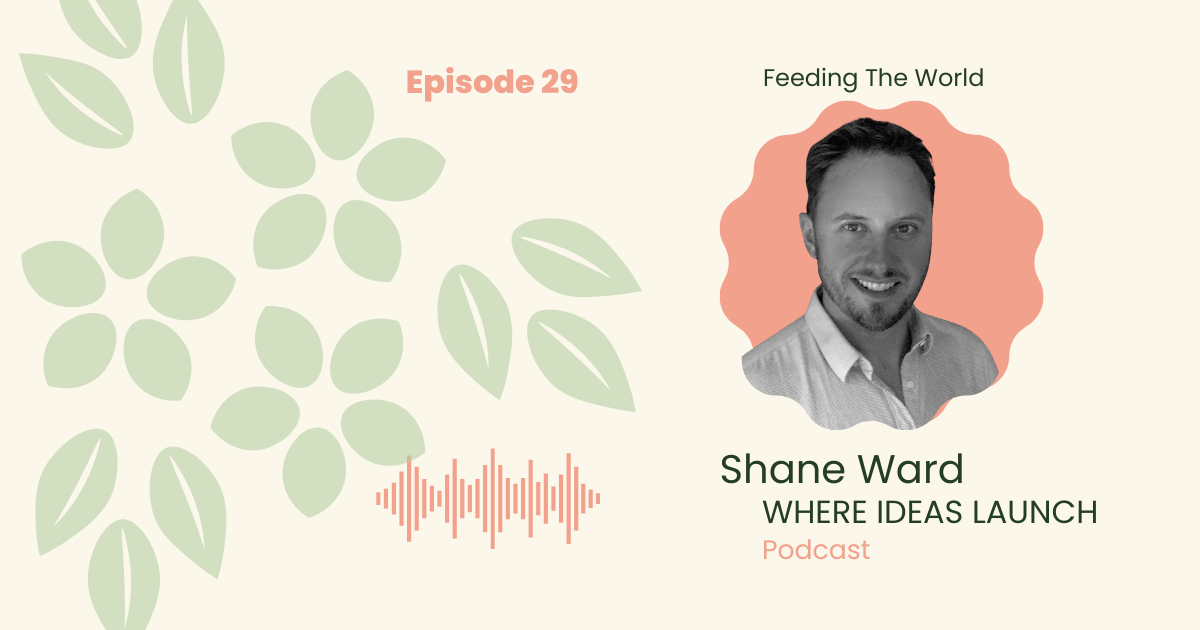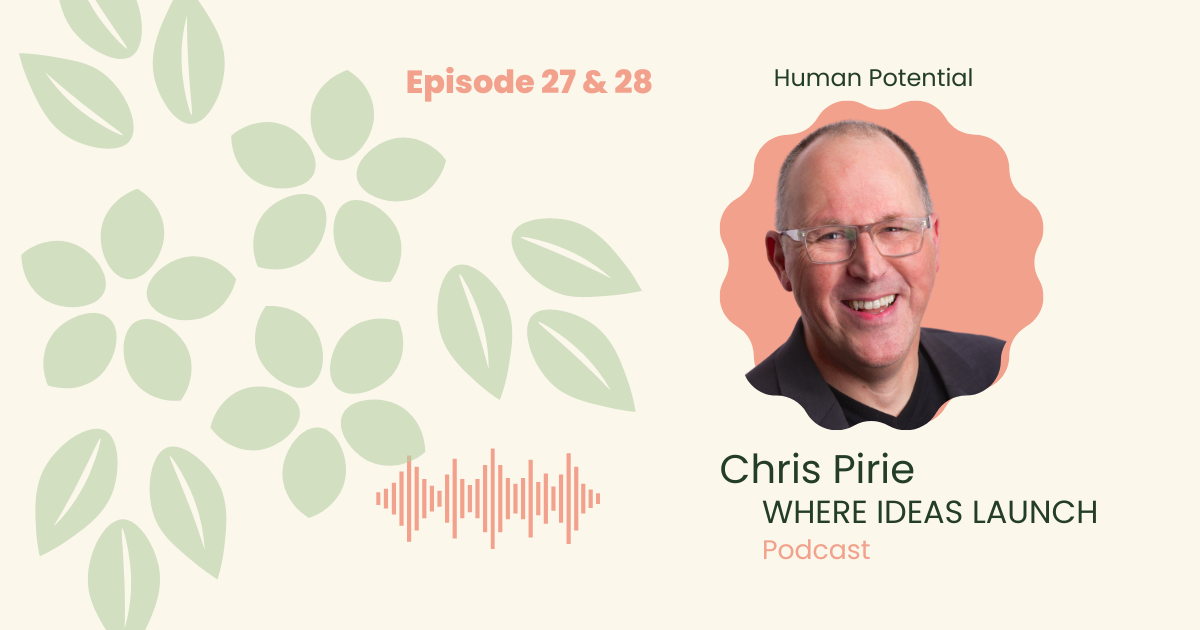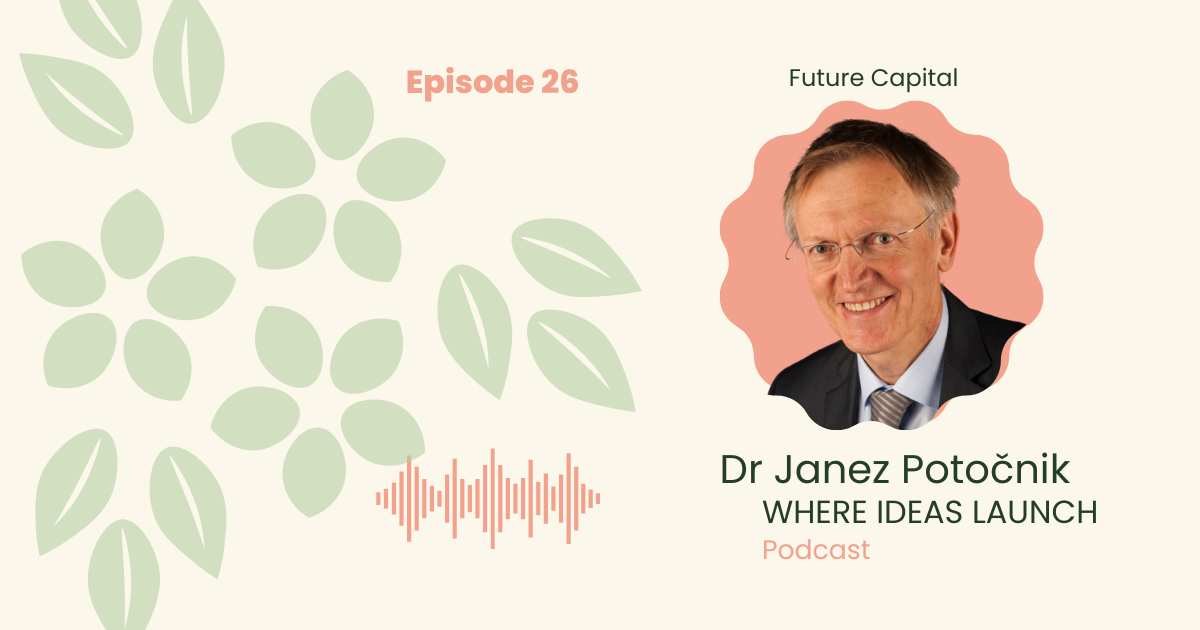071 The Ins and Outs of Migration
071 The Ins and Outs of Migration
About this Episode
My guest today is Jenny K Wright owner and consultant of Nomad Consulting. Jenny has been either working or volunteering with migration and migrants since 2001. She's relied on her project management research and communication skills to dedicate over a decade of her life to consulting for nonprofits and international organisations worldwide. She is currently working for the International Organisation for migration, IOM having globe trotting around half the world and soon to be living in her 10 country. Jenny is used to thinking on her feet, eating questionable food and living out of a suitcase, directing her Knack for writing to social media. She gained over 40,000 LinkedIn followers in a year. And she is in the process of launching her own blog on migrants guide to share hers and other migrants experiences of being on the move and living abroad.
Subscribe to Where Ideas Launch
Episode Transcript
Katherine Ann Byam 0:00
The best of the life lessons I've ever had, have come from travelling and living in different cultures among different people. Yet, we see so many frown upon migration and look upon migrants as something bad for their countries. I had a conversation with Jenny Wright to find out why she thought that was,
Jenny K Wright 0:20
I do think it's easier to relate with other people that that share a common history or their you know, common demographic, culture, religion and so on. And I, that is one portion of it and the fact that their neighbours would be another component, the it's something that it's it's harder to accept people that you feel like maybe somebody else should have accepted first, while when they are at your doorstep, it makes more sense to open the door.
Katherine Ann Byam 0:54
This is season five, the great debates of our times. Season Five will be centred around the great debate. And we will be comparing and contrasting different viewpoints on various topics that are consuming the public discourse at present. The reason I've decided to take this approach is because we, or are at least many of us losing the skill of debate. And I think this is an essential skill for us all to practice once more. I don't see how we get to the point of saving the world and saving our planet. If we don't know how to discuss our differences.
I also think that the solution to most of our challenges is somewhere in the spectrum of us have never at either extreme. I will be working with guests to curate the content and discuss beforehand, I will understand their positions, their areas of genius, and navigate my questions around that so that the conversation is challenging and stimulating without being combative. I hope you enjoy Season Five Where Ideas Launch the Sustainable Innovation podcast.
Welcome to this episode of the ins and outs of migration.
My guest today is Jenny K Wright owner and consultant of Nomad Consulting. Jenny has been either working or volunteering with migration and migrants since 2001. She's relied on her project management research and communication skills to dedicate over a decade of her life to consulting for nonprofits and international organisations worldwide. She is currently working for the International Organisation for migration, IOM having globe trotting around half the world and soon to be living in her 10 country. Jenny is used to thinking on her feet, eating questionable food and living out of a suitcase, directing her Knack for writing to social media. She gained over 40,000 LinkedIn followers in a year. And she is in the process of launching her own blog on migrants guide to share hers and other migrants experiences of being on the move and living abroad.
Katherine Ann Byam 2:50
Jenny Welcome to where Ideas Launch.
Jenny K Wright 2:51
Thank you very much for having me.
Katherine Ann Byam 2:52
What drove you into this world of migration and supporting people and communities with making this all work?
Jenny K Wright 3:01
Well, actually, I'm a migrant myself. I am half Swedish, half American, and I moved to Sweden when I was six years old. So I had never, that was my first experience living in another country, obviously. And I had to learn this brand new language and quite a different culture than what I was used to. So it made me really appreciate what other migrants might go through. And when my little village in Sweden started accepting refugees, I became extremely interested in the concept of the fact that we move it voluntarily, but some people do not. So that's what got me really interested in and working with migrants and with migration,
Katherine Ann Byam 3:40
identifying as a migrant, what do you see as the sort of advantages and disadvantages of this whole process?
Jenny K Wright 3:48
Well, I think what I really enjoy what I see other migrants also experienced is the kind of fresh set of eyes on on a situation or a way to problem solve things that maybe locals have not been able to see because you just can, you've experienced so many different environments, and you've seen how it could work in other contexts. So that's one of the advantages is a brand new skill set innovation in a way or some kind of creativity that might not already be there.
In terms of disadvantages, it could be just the differences of what you're used to, it can be extremely difficult when it comes to you know, learning a new language or new culture, a new system. And without a support network that you had in your country of origin, it can be quite difficult to overcome those obstacles to be able to contribute with with all those fresh ideas that you you are hoping to bring to your new country. So that's the it's connected in a way both advantages and disadvantages.
Katherine Ann Byam 4:48
It's interesting because for myself, I've been a migrant at least four times. I've also travelled a lot and tdone like two to three months, stints in places and That's really shown me a lot of my belief systems like it's really exposed them, because suddenly they're not relevant anymore. And you know, you show up in this new circumstance and you're like, wow, okay, that's new, that's different. How do I adjust? Here, how do I incorporate this when I go forward into the next experience? So it's always been essential to my growth, I think that I've moved around so much, I don't know how you reflect on that?
Jenny K Wright 5:28
Absolutely. I think that's one of the My greatest strengths. And then I usually do point that out to employers or to others and saying that one of the things I think, is the greatest experience for me, and what I think I learned more of than I did in school or the university is, is just travelling and living in a completely different environment. And I've, I've lived now in nine different countries, and quite soon will be my 10th country. And just like you said, you move into this new environment. And it's, it's incredibly interesting to learn all about that new country and the new culture, the new language, whatever it may be. But it also teaches you about yourself, and about views of the world that you didn't realise you had or biases you didn't even realise you had. And I think that's what really shows that how you can bring something to that that new environment, and you can you can take that with you when you go. So there's often that that that idea. And I'm curious if you've experienced that also, the idea of reverse culture shock, when you come back to your country of origin, the fact that you don't really understand why do we do it this way? I don't understand that anymore. But it was completely natural when you live there. Because you've experienced something different. You're you're almost it's almost like moving to a new country, even though you're moving back to your own country.
Katherine Ann Byam 6:39
Actually, I actually now think that I can't move back to my own country. Like I think I've changed too much to move back. Which is, yeah, it's exactly that it's exactly that sort of reintegration, sort of fear that you have, like, I'm not sure I can.
Unknown Speaker 6:55
Absolutely. I mean, I am very proud of the countries that come from, I think they're amazing, but I have no desire to live there. And I think it's because I've seen what else the world has to offer. And I want to see more. I just I think you just you have that wonder lust or you don't. And I just I don't think I could ever just go back to, to them, even though I'm very happy. And I'd love to visit. I just don't I don't see myself living there anymore.
Katherine Ann Byam 7:19
Exactly. I totally share that. So we recording this podcast on day 21 of Russia, Russia's, siege and invasion of Ukraine, a situation that is likely to reshape Europe's economy, foreign policy security, the humanitarian pressure is insane. Yet we've seen an incredible level of support across Europe and the world for the Ukrainian people. What are your thoughts on why Europe has been so welcoming to Ukraine, and so hostile in some cases? to othe rmigrants a difficult question?
Unknown Speaker 7:54
Yes. It's an interesting question, though i I can only speculate on you know, my what I personally think I don't know, any good explanation explanations for it. But I do think it's easier to relate with other people that that share a common history, their, you know, common demographic, culture, religion, and so on. And I, that is one portion of it, and the fact that their neighbours would be another component, the it's something that it's it's harder to accept people that you feel like maybe somebody else should have accepted first, while when they are at your doorstep, it makes more sense to to open the door. But I also think there's the, almost like a guilt in a way. And again, this is just me speculating. But I think that Europe feels like they they somehow owe this to the Ukrainians because of how the, especially the European Union, maybe, but also, NATO, for example, has been expanded East. And this was not something that was completely surprising, because it had been brewing for for quite some time now. So it might also be a form of guilt in a way to end lack of surprise, that they might be more willing to accommodate the Ukrainians than than other countries that they don't feel that same kind of connection to.
Katherine Ann Byam 9:13
Yeah, I mean, I know a lot of people speculate about about race as well and about the treatment of, let's say, migrants to to Ukraine, who were have darker skin colours as well. And do you think that it has anything to do with it?
Unknown Speaker 9:27
Personally, yes, unfortunately, I think that that has something to do with it. It's it's so even though I'm working from Tunisia right now, the my initial and personal contact to the Ukrainian crisis has been and large number of African migrants in like trying to leave Ukraine and being stopped or delayed at the border going into neighbouring countries. It's it's something that again, is anecdotal. I don't know how it wasn't there at the border. I'm not exactly sure what what went on there. But it is it is an interesting, interesting thing because it's something that We see also here in Tunisia, where there is a difference between people from when it basically depends on the passport you have, or lack of passport that you have, how welcoming people are for you to come in. Even if you're coming in through a regular border post, it should be no different than somehow there are delays, or lack of interest in processing people for for various reasons. And I don't have a good explanation for that. I've been told that has to do with class, but I feel like that's very 1800s. So I don't think it's that anymore. I think it unfortunately has to do with which passport you're holding.
Katherine Ann Byam 10:35
Yeah. And I think ultimately, it shows that this stuff is very complex. So one of the things I was reading recently is that for the UK, because I'm sitting in the UK today, they've decided to adjust their migration policies for Africa, in order to accommodate the Ukrainians as if there's like a quota system that they have in place for people that they will save or rescue from, from dire circumstances. And, you know, I wonder how, how this is really playing out in the population as well, you know, and I, you know, I'm not. So I just want to make this clear, like, I completely think that we need to support Ukraine, when they, when I look, my heart is broken for these people. And in fact, next week, I'm doing volunteer work to organise trucks to get goods and supplies there. But at the same time, I look at what's happening in the wider world. And I look at what's coming at us in terms of climate Jeopardy. And I'm concerned that we're not going to be able to respond appropriately. And I'm scared of the level of human suffering that we could encounter.
Unknown Speaker 11:46
I agree, and I share your concerns, because I think that part of the problem is the way that we are addressing it right now is it's quite outdated in a way. And it's also this, this idea, kind of going back to what we were saying about, you know, being migrants and realising that maybe we don't want to come back to our country of origin. And we have the option to that's something that I feel like is lost somehow. And I've worked with refugees and and since or fresh migrants and voluntary migrants since 2001.
Jenny K Wright 12:17
So a lot of it is anecdotal, I must admit, but I very few of them, regardless if they left because they wanted to, or they had to, after they've lived in another country for a while, they don't really have the desire to go back home. And it doesn't mean that they're not proud of where they came from where or anything with that it's just they got accustomed to where they were living. And they they they now feel like that's their home. And but still, somehow we operate under this, this theory that people will eventually go back. And I think it's wrong way of looking at it. Because it's first of all, it's not about like, where they go there, there should be. They could be going anywhere, in a way I think we need to be more flexible with where we're thinking of where people can go where they can be safe, where can they go, when they can actually be empowered, they should be able to be able to work, not necessarily storing them. And I hate to use that word, but it's sometimes I feel like we just we put them in a refugee camp. And then we feel good about ourselves.
It's not sustainable. And there's something that there's there's somehow no debates or proper debate on the durable solutions, a long term solutions for what's happening later. What is happening if this crisis is turning into a protracted crisis? Like what is the plan for these people to be able to, to provide for themselves and to have a real life that the children to go to school, the you know, the parents to be able to actually go to work, whatever it may be. And I think it's somehow lacking. It's more of this like, Okay, let's take them out of the situation. We'll put them here. And then nobody discusses what happens later. And it's also whenever you have these crisis after crisis, you're constantly focusing on the people that need the most help. Right now, while there are people that are constantly forgotten. They can't necessarily go back to the country of origin. But that doesn't either mean that they fall under the the legal definition of what a refugee is. And I think that's one thing that we have this, you know, the International Refugee Convention is as old as the UN in a way, but there hasn't been proper reforms to adjust to today's world. And I think that's just one of those challenges that we need to to think about is what happens next, what is the long term plan for these people? Because assisting them today, and having no long term plan is not assistance.
Katherine Ann Byam 14:35
What What are your thoughts on the kind of solutions we should be putting in place? What sort of reforms are you you're looking to shape as well, in the work that you do?
Jenny K Wright 14:45
Well, one thing that I think is really important is the idea that and I think it's something that we is one of the positive things that came out of COVID If I may say so, is the idea that people realise you don't have to be physically present in one office or in one country to be able to do your work. And I really been pushing this for several years long before COVID. Just because there's, my background is in risk management, I'm always looking at, like, what happens if you can't make it to work for Sunday. And I always try to get employers to think about, you know, you have parents that are or caretakers, or you have someone who has a disability that prevents them from going to the office, but not necessarily not doing their job. So you have all these different reasons why people might not be able to have a traditional job, but still would be an amazing asset to any employer. And someone who is refugee by that termination or displaced in some way, that having those either remote online digital jobs available to them, would really help because you could be anywhere, literally, and you could be able to still provide for yourself. And it's something that we need to get out of this this mindset that you have to be there in person and doing the work and trying to figure out a way for work to be global. And what does that look like in terms of taxes and social protection, you know, benefits and insurance. I don't have all the answers to this. But I'm what I was hoping is that this debate would really kick off thanks to COVID because there is a huge potential of just having talent, being borderless. And it would really help those people that are affected by crisis's or affected by climate change if they had those opportunities to work from anywhere, and still be able to find they can maybe move to another country to be safe and work in another country to make a living whatever may look like it doesn't have to be that rigid and in our solutions that we find for them.
Katherine Ann Byam 16:44
Now, that's great. And I want to kind of hone in on this climate Jeopardy topic, because this is a sustainability podcast. So it has to come up. But what are your thoughts on who has responsibility and how we should go about addressing this ongoing challenge in the near term and long term? So really looking at the climate stressed region? So like, we know that there are many areas and regions, you know, torn by wars and different sorts of crises. But when we look at the climate Jeopardy, and we look at the numbers, it it suggests that there are roughly three 3 billion people who could become impacted by this within the next 20 years or so. How should we prepare? And whose responsibility is it?
Jenny K Wright 17:33
Well, the easy question that would be that we're all responsible, right, and then in a certain way that most of us have in some way contributed to the crisis we're seeing right now, or our ancestors did. So I think that first of all, is we all have some kind of accountability when it comes to the solution in this also, but I am one of those who believe that the governments that can afford to to solve this problem should be the ones pitching in the most. But it's it's also something in terms of not just about cutting, cutting back on the bad behaviour, so to speak, the emissions and the just the the wasteful waste, I guess, the wasteful usage of our resources, but also trying to share the wealth when it comes to knowledge, when it comes to adaptation strategies, different types of resilience methods that people from the especially these climate, mostly the climate change affected countries could really benefit from, because I have lived in some of these countries that are really affected by you know, sea level rising, and just the increase in natural disasters. And they're often not aware of how certain of their their traditional practices might be fueling this.
So while I'm not definitely not saying that they are the cause of this, because I believe that more developed countries are the ones really contributing to the climate change here. But there's also a correlation with these, you know, hundreds of years old practices, that is not conducive to sea level rising. So there's, or whatever the hazard might be, but it's one of those things where we can share knowledge when it comes to how to do things differently, just like we can learn a lot from especially from indigenous populations to have been able to be self sustainable, and without messing up with the ecosystem of how we can do things better when it comes to managing our natural resources. At the same time, there's a lot of things and new science and technology can can show for the other, more traditional societies that might benefit the way maybe how you construct houses or agricultural products, or processes that are much better for the environment that don't involve, you know, cutting down or burning down trees to make room and so on. So there's, there's different ways where we can learn from each other. And I don't think that we're doing that enough, either.
Katherine Ann Byam 19:52
Yeah. And what will you recommend to people who are located in these climate Jeopardy zones, like, what should they be doing? for their own self determination,
Jenny K Wright 20:01
it's difficult because there's often a lack of financial resources. So for me to give, give them advice on what to do is quite difficult. But one thing that I would encourage is so before I moved to Tunisia, the other country office that I worked in was in Timor Leste. So it was very interesting to see how these Pacific countries are preparing for what will happen if the sea level rise is more and some of them are already speaking with neighbouring countries to see they've even relocated entire villages. So that's one thing is to kind of look into migration pathways like looking into different types of seasonal work to eventually become more of a permanent situation, engage with neighbouring countries that might have the resources to do scientific research, for example, to see which communities might be affected first, we're already are, and what options are there for them. And if it's something that they can't fund, afford themselves, then perhaps there are others that could help another avenue could possibly be to make the visas free for academics to come and do research in the country or engineers to come in construct different types of buildings or infrastructure that are more climate resilient. So there's there is options for for them, that might not necessarily need to cost a lot that could still help in terms of in the long term, preparing for what will happen if this gets any worse.
Katherine Ann Byam 21:35
Now, these are really, really good tips. I love your ideas and solutions. And I hope they're listening because there are things that actually we can engage in to kind of build solutions faster. One of the areas that I that I studied during my MBA was around frugal innovation, right. And it was really talking about this, this social impact type of innovation that happens that actually provides really robust solutions for very low cost. And I think that this is part of what we need to be championing everywhere, like really looking at how we can use the environment around us to, to develop ideas to develop new thinking to, to break the mould, right, that's when we're not looking for profits anymore, the way that we break the mould that could be completely different. And the way that we approach solutions can be completely different. So it would be great to see us embrace more of this in all of the countries, to be honest.
Jenny K Wright 22:34
Absolutely. And I think another thing is definitely trying to share that, that enthusiasm with the next generation, it's, it's something that I probably think is the most sad is when I see young people, you know, throwing trash, you know, for example, right now I'm close to the beach, and it's a beautiful beach. But I've noticed that young people here often throw their trash right on the beach, including, you know, breaking bottles or throwing plastic into the ocean. And it's, it's very sad to me to see that because this country is so beautiful, and they they make a lot of money on tourism. And there's there's just no it seems to be like no view of the consequences of one's action and how that affects the future of the economy of the country, but also the environment around you. So that's something that I think is more on an individual level that we can hopefully teach our children to, to respect and to ensure that things are more beautiful than we found them and to never trash the resources that we've been given or waste them unnecessarily.
Katherine Ann Byam 23:44
Yeah, totally agree. Would you say that the international aid sector is doing enough to help alleviate the pressures?
Jenny K Wright 23:55
In terms of the the climate crisis?
Katherine Ann Byam 23:57
in terms of the climate crisis, or even in general, in terms of the refugee crisis? Do you feel like the international aid sector is are resourced enough and doing or spending their efforts in the right ways to help?
Jenny K Wright 24:11
I think the intentions are great. I one thing that so I worked with IOM in in Zimbabwe in 2010. And I worked there for a year and then I took basically a nine year hiatus, working with governments and then nonprofits and private sector. And what was interesting to me when I came back working for, you know, international organisations again, nine years later that I didn't really see that much had changed. We had changed from the Millennium Goals to the sustainable development goals, but in general, it didn't seem like we had achieved that much. So I think part of the part of the issue is that we are incredibly compartmentalised not only within the different agencies but also I across agencies and between, not you know, NGOs and the IGOs, like the UN system versus the civil society on the on more on a national level, or just between the different actors that can make a difference are not as coordinated as they could be. And we try don't don't get me wrong, everyone does. But there, there should be so much more coordination when it comes to everything from the design to the implementation to evaluating what has been done to ensure that there is an impact every single time. And then teaching those lessons learned and best practices so we can replicate what works and learn from the mistakes of others to not repeat that. And I feel like that's still something that's, that's lacking, and we're getting better at it. But I just wish we had got better at it 50 years ago.
Katherine Ann Byam 25:49
No, I totally understand what you mean. And I see it now with all of the effort that's happening with Ukraine that, that there's not a hell of a lot of coordination, but resources are getting there. And people are doing their best to sort of support the flow of resources and even people to help out. But definitely, it looks as if there's an opportunity for for better coordination and harmonisation in some way.
Jenny K Wright 26:17
Absolutely. I think that I mean, the desire to help is there, which is great and is admirable, but there is better ways to do a lot of things that I think that's that's why I always get the jobs that I like, are always in an inter-agency kind of function working with different partners trying to show that there is ways for international community to work with the local civil society working with governments at all various levels, and with the private sector hand in hand, to do something that works for everyone, and showing that everyone has a part to play in the solution. Because I just think that you have often these, you know, one off projects, and this is this is not just the fault of organisations, per se is usually where the funding comes from is many organisations are project based, it's it's how many of us get our funding, and it's really difficult to to do anything that will have a long term impact when we're expected to change the world and 12 months. So it's it's one of those things that the the development partners that do have enough funding to be able to, to really make an impact to also get out of that mindset that, you know, change does not happen overnight. And if we really want to have a sustainable impact, and hopefully not have to continue giving to the same country or the same group of people, then we need to think more long term with a properly planned programme that that is, you know, scientifically sound evidence based, you know, replicating what works, and then having these actual results that we are trying to achieve. And I really hope to see that soon.
Katherine Ann Byam 27:52
I was talking and interviewing someone who works in support of some sort of privately funded agencies that work in Africa. And one of the things that came up is that he was comparing sort of the entire aid budget overall, and looking at how much corporations spend on training, and realise that actually, the investment corporations make on training, which impacts a very small amount of people is much more than the international aid budget overall. And I thought that was a really interesting statistic. Do you think that corporations need to do more? Or do you think that they're doing enough?
Jenny K Wright 28:34
I think what they need to do is understand that they actually have something to benefit from helping not just from like a corporate social responsibility perspective. But there's there's also this huge potential of if you help people with economic opportunities, where they can potentially get jobs, or they had the ability to save money on something, whatever maybe is that could actually be good for their business. So there could be a connection between increased revenue for many companies just by actually helping the local community where they serve anyway. So there's there's also that but there's also the idea of testing new innovations to see if it works and trying to to be part of the change. And and that's incredibly great marketing, even if it's not necessarily part of the CSR approach. But I think that's something that I always thought that's why because I worked for many years in private sector, I tried to show them that they have so much to give to the aid sector in terms of how you do something with that kind of business mindset, which a lot of people seem to think is some kind of dirty word when it comes to when you work in humanitarian assistance are an in development work, but it's not. It really should be something that makes financial sense on how you do something. It should be kind of going back to your own idea of you know, being frugal and You need to do something that generates results. So there needs to be a return on investment. Even if we're talking about people's lives or their their rights, there should still be some kind of accountability for how you spend your money. And that there is proper planning when it comes to what kind of results you're expecting. And I do think the private sector does this well in many aspects, and we can learn from them. And likewise, companies can learn from humanitarian organisations or development agencies on how they can do things that help the community that would actually make the community able to be more of a consumer of their products or services also, so could be good for their own income by helping others.
Katherine Ann Byam 30:45
Yeah, no, I love this. I want to ask you one final question. And that is about working in a sector. So I know that you've been doing this for some time. Now, I'm not sure exactly how long so you can feel free to include that in your answer. But how does one really go about getting involved in this space? And what's what's your recommendation? And from from both sides, so I know that there's directly humanitarian type operations, but in terms of policy setting, and all of these things help, how can we get involved?
Jenny K Wright 31:21
I think the the main way to answer that is it depends like what you're interested in, because often in this sector, it might not pay very well. So it helps if you have a huge dose of of energy and enthusiasm for whatever the subject may be that you want to get involved in. So for me personally, because I come from a family that that really loves, charities and and, and we were always raised that if you can help you should help. So for me, there was really no other option. I always I've been volunteering since 2001, to answer your questions over 20 years working with, mainly with migrants, but also with animals, I've worked with various environmental organisations, I, I just love it both working and volunteering. So in terms of getting started, I, I see there's always opportunity of volunteering, not everyone can afford that. But there are plenty of opportunities to do that, for example, online, even if it's just an hour a week to see, you know, get your feet wet and see if it's something that interests you. There are plenty of both unpaid and paid internships where you can get a chance to see what it would be like to do a career in those areas. In terms of getting started with that, I would definitely recommend applying anywhere everywhere, because internships are very rarely published, especially with smaller organisations and at country level. So that's something that many people don't think about. And they only apply to the ones that are posted. But there are so many more out there if you're just willing to to send some applications out and see who might be able to hire. Those are both great opportunities to get the foot in the door and to show what you're to see if it's something that's interesting, but also to show what you can do. Oh, sorry, to ask you a question about policy. I think that's something where creating a platform is a great way to do that to show that you can influence people be on social media, or be it in person or whatever it may be. So in terms of trying to get into more of the advocacy, sphere, or policy and so on. Showing that you are able to change the hearts and minds of people is a great way to get people interested in you working for them.
Katherine Ann Byam 33:38
How can people get involved with what you're doing and support your work?
Jenny K Wright 33:42
Well, for example, in art, we're about to launch a new initiative in the country offices. I'm working right now with more of Ambassador programme. It's it's a volunteer type programme, but the idea is to kind of vet some some young influencers, who are interested in migration and the positive aspects of that could have in terms of contributing to the economic development of countries, in this case, Tunisia. And we already have some people that we have selected for the group, but there's going to be I'm more than happy to get more applications for that if anyone wants to help promote different positive initiatives that are being done to show that migrants are contributing positively to their their host communities. There's actually another global campaign called it takes a community. It's a global campaign by IOM called the it takes a community and it also shows the positive contributions of migrants into the their host communities and how we can all work together to create a better community and future for everyone. And I think that's a really positive campaign. That's a good way to for others to contribute and pitch in and it doesn't take a lot of time. It's just more kind of highlighting these these nice stories that often unfortunately, don't make it to the news. But just some success stories or some nice positive examples of how people can work together and no matter what the their backgrounds might be. So that's one way to get involved in that area.
Katherine Ann Byam 35:16
Tell everyone about migrants guide.
Jenny K Wright 35:19
So a migrants Guide is a new blog that we are about to launch. And the idea is to create kind of a repository of helpful articles and resources and stories from migrants around the world for other migrants either aspiring already current migrants to be better prepared before they move to a new country. I don't know about you, but I always look for blog articles, or other real life stories from people who have already moved to the country I'm heading to, to know what to expect to know what to pack to know what I need to think about before I go there like it, it all really helps. And the idea is to create this blog by everyone helping everyone who is interested in moving to another country with these helpful tips. So if anyone is has lived or is living in another country, and we'd be willing to either write an article or write a short story about their experience, and what kind of lessons they learned, or what kind of tips they would like to give to somebody else, that would be extremely useful and very much welcomed them.
Katherine Ann Byam 36:27
Thank you so much, Jenny. And I'm definitely going to put all these links into the show notes so that people can get engaged with all of this. So please remember to check out the show notes and follow Jenny's links. Jenny is also a huge influencer on LinkedIn, and she has over 40,000 followers. So if you wanted to connect with her account on LinkedIn, I'm sure you're going to get signposted to all these great resources that she posts about regularly. So, Jenny, thank you so much for joining us. And thank you so much. Let's let's all collaborate and make this migration challenge really become an opportunity for for everyone and for the world.
Jenny K Wright 37:03
Yes, that'd be amazing. Thank you very much again.
Katherine Ann Byam 37:08
This podcast is brought to you today by the brand new women in Sustainable Business Awards, that kicks off in 2023. If you're a business owner who's starting a business with principles of sustainability in mind, and you want to preserve some lost skills, some handcrafting or artisanal work, or you're a social media manager supporting purpose driven brands, or you're creating fashion was something that is relevant to the sustainability in green transformation. You are more than welcome to join us and to get involved in these awards. Check out our group on Facebook women in sustainable business. Or follow the podcast where ideas launch on Instagram to find out more
